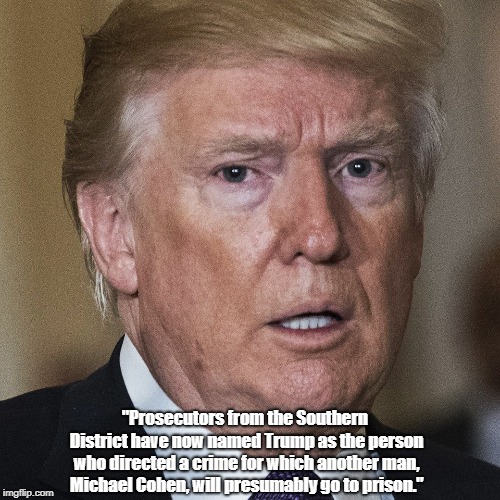
"The Michael Cohen Sentencing Memos Are Damning for Trump"
Adam Davidson, The New Yorker
On Friday, federal prosecutors released two memorandums on Michael Cohen, one from Department of Justice prosecutors with the Southern District of New York, the other from the office of the special counsel Robert Mueller. While they are ostensibly designed to guide Cohen’s sentencing, they carry far greater weight. These documents make clearer than ever before the case against President Trump. The special counsel’s seven-page memorandum, along with court documents from Cohen’s guilty plea last week, lay out a straightforward time line.
In September, 2015, Trump approved Cohen’s plan to reach out to the Russian government. That November, Cohen “spoke with a Russian national who claimed to be a ‘trusted person’ in the Russian Federation who could offer the campaign ‘political synergy’ and ‘synergy on a government level.’ ” Cohen’s contact “repeatedly proposed” a meeting between Trump and Russian President Vladimir Putin, suggesting that it would have a “phenomenal” effect on Trump’s efforts to build a Trump Tower in Moscow, which Mueller’s filing calls the “Moscow Project.”
The memo notes that Cohen did not pursue the meeting, “in part because he was working on the Moscow Project with a different individual who Cohen understood to have his own connections to the Russian government.” That December, Cohen—with Trump’s knowledge and approval—began working with Felix Sater, a longtime Trump associate with Russia connections, on the Trump Tower Moscow proposal. In the following months, Cohen spoke with a Kremlin adviser.
Cohen and Sater ultimately did discuss a meeting between Putin and Trump. (The meeting did not occur.) Mueller, in his memo, makes certain that readers know that Cohen was not acting on his own but “continued to work on the project and discuss it with Individual-1”—Trump—“well into the campaign.”
The filing comes close to suggesting collusion without actually making that case. Mueller notes that Cohen’s effort to engage Russia with Trump’s knowledge and consent “occurred at a time of sustained efforts by the Russian government to interfere with the U.S. presidential election.” Mueller provided another hint by praising Cohen for providing the special counsel’s office “with useful information concerning certain Russia-related matters core to its investigation.” There is arguably only one matter core to the Mueller investigation, as defined by Mueller’s appointment as special counsel: “to ensure a full and thorough investigation of the Russian government’s efforts to interfere in the 2016 presidential election . . . [and] any links and/or coordination between the Russian government and individuals associated with the campaign of President Donald Trump.” If Cohen’s information is core to the Mueller investigation, it is reasonable to conclude that Mueller does, indeed, believe he can prove that there was collusion between the Trump campaign and the Russian government.
However—perhaps maddeningly for people who have been waiting for clarity on Mueller’s investigation—he does not, in the sentencing memo, lay out the details of possible collusion. But the document tells another damning story: Cohen repeatedly lied about his work, on behalf of Trump, to make money and develop political ties with the Kremlin. His lies were “a deliberate effort” intended “to set the tone and shape the course of the hearings in an effort to stymie the inquiries.”
Once again, Cohen was not on his own, deciding to lie for his own purposes. He was in regular contact with unspecified people in the White House. Cohen provided the special counsel’s office with “relevant and useful information concerning his contacts with persons connected to the White House during the 2017-2018 time period,” which “has been credible and consistent with other evidence obtained in the SCO’s ongoing investigation.”
The Southern District of New York’s simultaneously released sentencing memoalso has serious legal ramifications for the President. In describing how Cohen bought the silence of two women with whom Trump had affairs in order to help Trump win the Presidency, it makes clear that Cohen “acted in coordination with and at the direction of Individual-1.” Three months ago, Cohen said in his guilty plea that this was true and that the President was implicated in a criminal scheme to sway the election. Now, though, federal prosecutors working under Robert Khuzami, the acting U.S. Attorney, feel confident enough in this assertion that they have tied themselves to it.
For the President and those close to him, these are terrifying and damning documents. The prosecutors from the Southern District have now named Trump as the person who directed a crime for which another man will presumably go to prison. Meanwhile, Mueller has demonstrated that he has evidence to show that Trump used his campaign for personal enrichment at the expense of American interests and lied about it, in a way that suggests knowledge of guilt. It may not, in the end, be part of a collusion plot. But it is very bad.
No comments:
Post a Comment